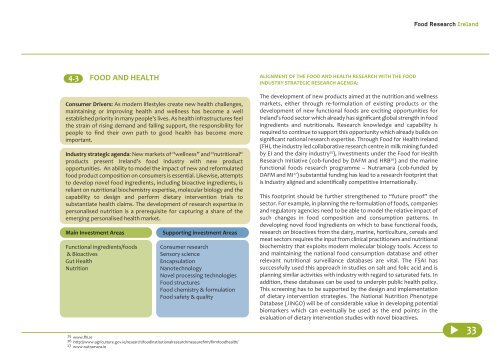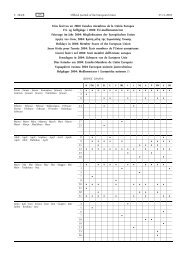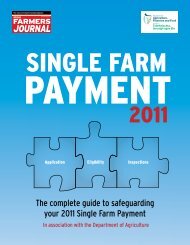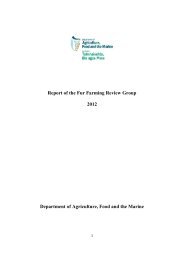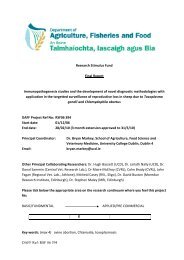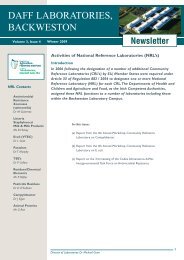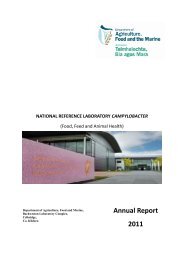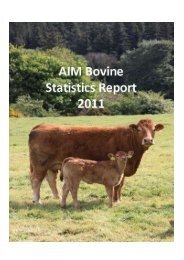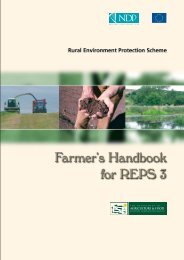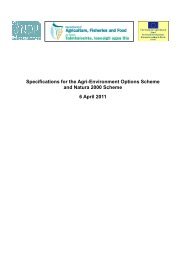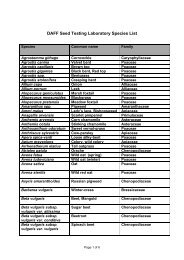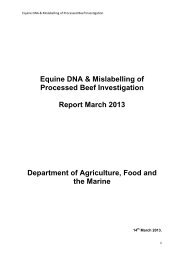Food Research Ireland - Department of Agriculture
Food Research Ireland - Department of Agriculture
Food Research Ireland - Department of Agriculture
Create successful ePaper yourself
Turn your PDF publications into a flip-book with our unique Google optimized e-Paper software.
4.3 FOOD AND HEALTH ALIGNMENT OF THE FOOD AND HEALTH RESEARCH WITH THE FOOD<br />
INDUSTRY STRATEGIC RESEARCH AGENDA:<br />
Consumer Drivers: As modern lifestyles create new health challenges,<br />
maintaining or improving health and wellness has become a well<br />
established priority in many people’s lives. As health infrastructures feel<br />
the strain <strong>of</strong> rising demand and falling support, the responsibility for<br />
people to find their own path to good health has become more<br />
important.<br />
Industry strategic agenda: New markets <strong>of</strong> “wellness” and “nutritional“<br />
products present <strong>Ireland</strong>’s food industry with new product<br />
opportunities. An ability to model the impact <strong>of</strong> new and reformulated<br />
food product composition on consumers is essential. Likewise, attempts<br />
to develop novel food ingredients, including bioactive ingredients, is<br />
reliant on nutritional biochemistry expertise, molecular biology and the<br />
capability to design and perform dietary intervention trials to<br />
substantiate health claims. The development <strong>of</strong> research expertise in<br />
personalised nutrition is a prerequisite for capturing a share <strong>of</strong> the<br />
emerging personalised health market.<br />
Main Investment Areas Supporting investment Areas<br />
Functional ingredients/foods Consumer research<br />
& Bioactives Sensory science<br />
Gut Health Encapsulation<br />
Nutrition Nanotechnology<br />
Novel processing technologies<br />
<strong>Food</strong> structures<br />
<strong>Food</strong> chemistry & formulation<br />
<strong>Food</strong> safety & quality<br />
25 www.�i.ie<br />
26 http://www.agriculture.gov.ie/research/foodinstitutionalresearchmeasurefirm/firmfoodhealth/<br />
27 www.nutramara.ie<br />
The development <strong>of</strong> new products aimed at the nutrition and wellness<br />
markets, either through re-formulation <strong>of</strong> existing products or the<br />
development <strong>of</strong> new functional foods are exciting opportunities for<br />
<strong>Ireland</strong>’s food sector which already has significant global strength in food<br />
ingredients and nutritionals. <strong>Research</strong> knowledge and capability is<br />
required to continue to support this opportunity which already builds on<br />
significant national research expertise. Through <strong>Food</strong> for Health <strong>Ireland</strong><br />
(FHI, the industry led collaborative research centre in milk mining funded<br />
by EI and the dairy industry 25 ), investments under the <strong>Food</strong> for Health<br />
<strong>Research</strong> Initiative (cob-funded by DAFM and HRB 26 ) and the marine<br />
functional foods research programme – Nutramara (cob-funded by<br />
DAFM and MI 27 ) substantial funding has lead to a research footprint that<br />
is industry aligned and scientifically competitive internationally.<br />
This footprint should be further strengthened to “future pro<strong>of</strong>” the<br />
sector. For example, in planning the re-formulation <strong>of</strong> foods, companies<br />
and regulatory agencies need to be able to model the relative impact <strong>of</strong><br />
such changes in food composition and consumption patterns. In<br />
developing novel food ingredients on which to base functional foods,<br />
research on bioactives from the dairy, marine, horticulture, cereals and<br />
meat sectors requires the input from clinical practitioners and nutritional<br />
biochemistry that exploits modern molecular biology tools. Access to<br />
and maintaining the national food consumption database and other<br />
relevant nutritional surveillance databases are vital. The FSAI has<br />
successfully used this approach in studies on salt and folic acid and is<br />
planning similar activities with industry with regard to saturated fats. In<br />
addition, these databases can be used to underpin public health policy.<br />
This screening has to be supported by the design and implementation<br />
<strong>of</strong> dietary intervention strategies. The National Nutrition Phenotype<br />
Database (JINGO) will be <strong>of</strong> considerable value in developing potential<br />
biomarkers which can eventually be used as the end points in the<br />
evaluation <strong>of</strong> dietary intervention studies with novel bioactives.<br />
<strong>Food</strong> <strong>Research</strong> <strong>Ireland</strong><br />
▼<br />
33


